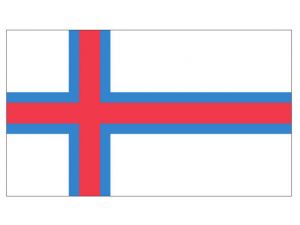Language/Faroese/Culture/Faroese-Holidays
| ◀️ Prepositional Phrases — Previous Lesson | Next Lesson — Faroese Music and Dance ▶️ |
Faroese holidays and celebrations are an essential part of the Faroese culture. They are occasions for families and friends to come together, celebrate and enjoy the traditions that have been passed down through generations. In this lesson, you will learn about the main Faroese holidays and their traditions.
Ólavsøka
Ólavsøka is the national holiday of the Faroe Islands, celebrated on July 29th in honor of Saint Olaf, the patron saint of Norway. This holiday marks the beginning of the parliamentary session of the Faroe Islands, the Løgting, which is held in Tórshavn.
To celebrate Ólavsøka, Faroese people wear their national costume, attend church services, and participate in various cultural events throughout the islands. The national flag, Merkið, is also flown on this day, and it is common to see traditional Faroese boat races, called Róðrarfelag, held in different locations. In the evening, people gather for celebratory meals and music, the most popular being a form of folk dancing known as "polka".
Christmas
Christmas, or Yule, is the most important religious and cultural holiday in the Faroe Islands, celebrated on December 24th and 25th. This festive time is marked with traditional foods, live music, and dance.
On Christmas Eve, Faroese families gather for dinner, which typically includes a roasted leg of lamb, potatoes, and a variety of Christmas pastries, such as Klejner and Laufabrauð, a thin, crisp bread that is decorated with intricate designs. After dinner, people attend midnight mass, where the Faroese version of "Silent Night" is sung, called "Stilla Nátt".
On Christmas Day, another festive meal is served, and families spend time together exchanging gifts, playing games, and enjoying the holiday season. In the days leading up to Christmas, it is common to see Christmas markets in various towns throughout the islands, selling traditional Faroese crafts and decorations.
Bóndadagur
Bóndadagur, Farmer's Day, is celebrated on January 12th and marks the beginning of the farming season for the upcoming year. On this day, Faroese people honor their agricultural traditions by preparing traditional food, such as a hearty soup made with smoked lamb or mutton, and by engaging in patur, an ancient practice where farmers and their families serenade their livestock and wish them good health for the year.
Flag Day
Flag Day is celebrated on April 25th in memory of the soldiers who died during the Second World War. On this day, the Faroese flag is flown at half-mast, and a parade is held in Tórshavn to honor those who lost their lives in the line of duty.
National Day
National Day, or Grunnlovsdagur, is celebrated on June 5th and marks the signing of the Faroese constitution in 1948. On this day, the Faroese flag is flown, and citizens gather for speeches, ceremonies, and cultural events.
Conclusion
Faroese holidays and celebrations serve as an important link to the past, connecting Faroese people to their cultural heritage and traditions. By participating in these events, visitors and newcomers to the Faroe Islands can gain an understanding of the unique culture and customs of this remote island nation.
Remember to embrace the culture and customs of the Faroe Islands by participating in the local celebrations and traditions during your visit!
Other Lessons
| ◀️ Prepositional Phrases — Previous Lesson | Next Lesson — Faroese Music and Dance ▶️ |

